Leon Kopitar
Plain language adaptations of biomedical text using LLMs: Comparision of evaluation metrics
Dec 18, 2025Abstract:This study investigated the application of Large Language Models (LLMs) for simplifying biomedical texts to enhance health literacy. Using a public dataset, which included plain language adaptations of biomedical abstracts, we developed and evaluated several approaches, specifically a baseline approach using a prompt template, a two AI agent approach, and a fine-tuning approach. We selected OpenAI gpt-4o and gpt-4o mini models as baselines for further research. We evaluated our approaches with quantitative metrics, such as Flesch-Kincaid grade level, SMOG Index, SARI, and BERTScore, G-Eval, as well as with qualitative metric, more precisely 5-point Likert scales for simplicity, accuracy, completeness, brevity. Results showed a superior performance of gpt-4o-mini and an underperformance of FT approaches. G-Eval, a LLM based quantitative metric, showed promising results, ranking the approaches similarly as the qualitative metric.
UM_FHS at TREC 2024 PLABA: Exploration of Fine-tuning and AI agent approach for plain language adaptations of biomedical text
Feb 19, 2025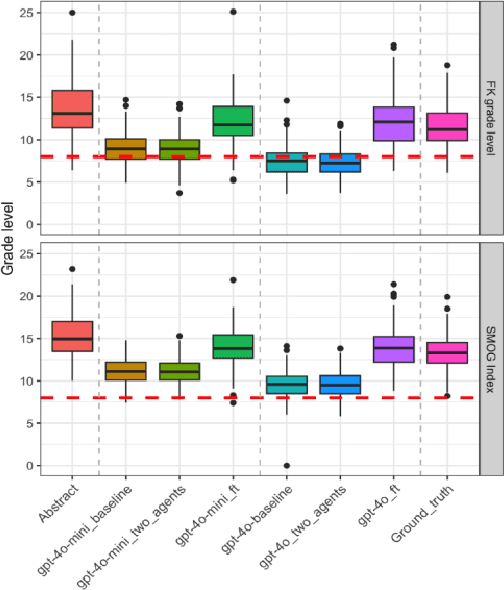
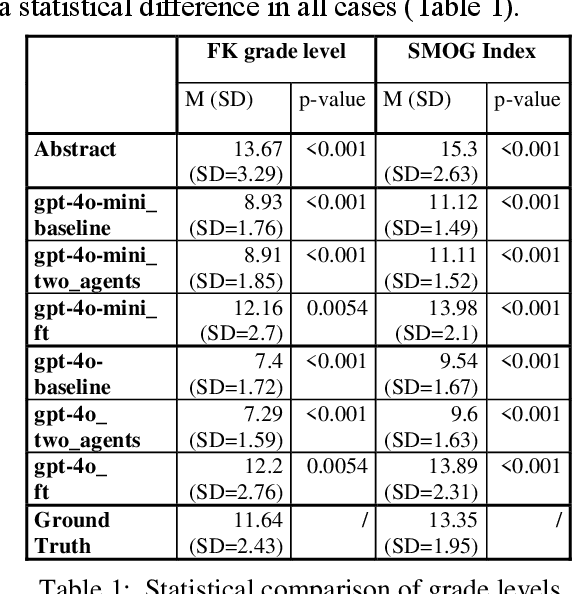

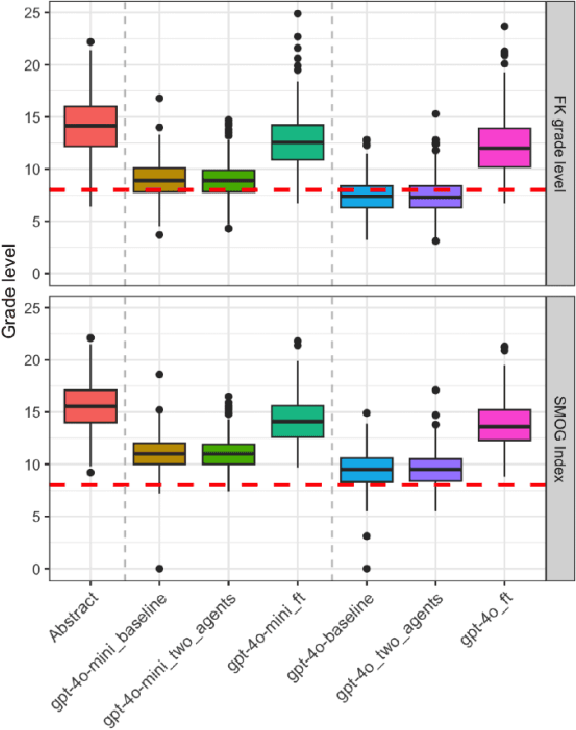
Abstract:This paper describes our submissions to the TREC 2024 PLABA track with the aim to simplify biomedical abstracts for a K8-level audience (13-14 years old students). We tested three approaches using OpenAI's gpt-4o and gpt-4o-mini models: baseline prompt engineering, a two-AI agent approach, and fine-tuning. Adaptations were evaluated using qualitative metrics (5-point Likert scales for simplicity, accuracy, completeness, and brevity) and quantitative readability scores (Flesch-Kincaid grade level, SMOG Index). Results indicated that the two-agent approach and baseline prompt engineering with gpt-4o-mini models show superior qualitative performance, while fine-tuned models excelled in accuracy and completeness but were less simple. The evaluation results demonstrated that prompt engineering with gpt-4o-mini outperforms iterative improvement strategies via two-agent approach as well as fine-tuning with gpt-4o. We intend to expand our investigation of the results and explore advanced evaluations.
Chapter 7 Review of Data-Driven Generative AI Models for Knowledge Extraction from Scientific Literature in Healthcare
Nov 18, 2024



Abstract:This review examines the development of abstractive NLP-based text summarization approaches and compares them to existing techniques for extractive summarization. A brief history of text summarization from the 1950s to the introduction of pre-trained language models such as Bidirectional Encoder Representations from Transformer (BERT) and Generative Pre-training Transformers (GPT) are presented. In total, 60 studies were identified in PubMed and Web of Science, of which 29 were excluded and 24 were read and evaluated for eligibility, resulting in the use of seven studies for further analysis. This chapter also includes a section with examples including an example of a comparison between GPT-3 and state-of-the-art GPT-4 solutions in scientific text summarisation. Natural language processing has not yet reached its full potential in the generation of brief textual summaries. As there are acknowledged concerns that must be addressed, we can expect gradual introduction of such models in practise.
Identifying and Decomposing Compound Ingredients in Meal Plans Using Large Language Models
Nov 08, 2024Abstract:This study explores the effectiveness of Large Language Models in meal planning, focusing on their ability to identify and decompose compound ingredients. We evaluated three models-GPT-4o, Llama-3 (70b), and Mixtral (8x7b)-to assess their proficiency in recognizing and breaking down complex ingredient combinations. Preliminary results indicate that while Llama-3 (70b) and GPT-4o excels in accurate decomposition, all models encounter difficulties with identifying essential elements like seasonings and oils. Despite strong overall performance, variations in accuracy and completeness were observed across models. These findings underscore LLMs' potential to enhance personalized nutrition but highlight the need for further refinement in ingredient decomposition. Future research should address these limitations to improve nutritional recommendations and health outcomes.
Improving Primary Healthcare Workflow Using Extreme Summarization of Scientific Literature Based on Generative AI
Jul 24, 2023
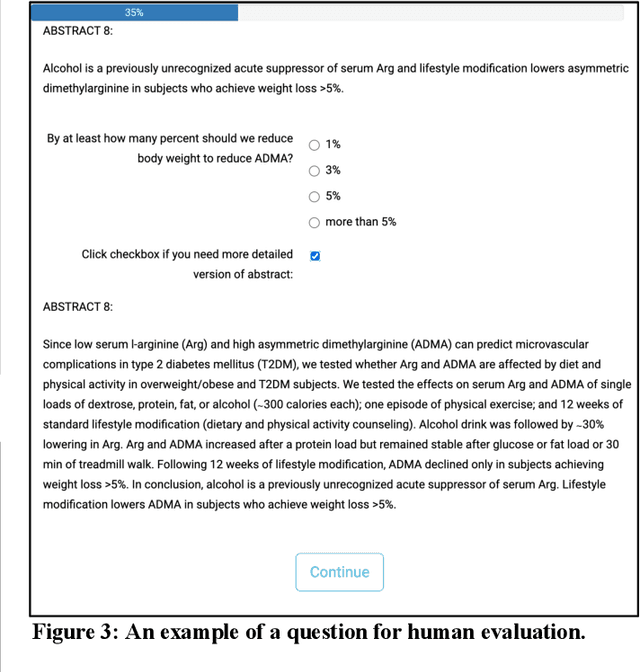
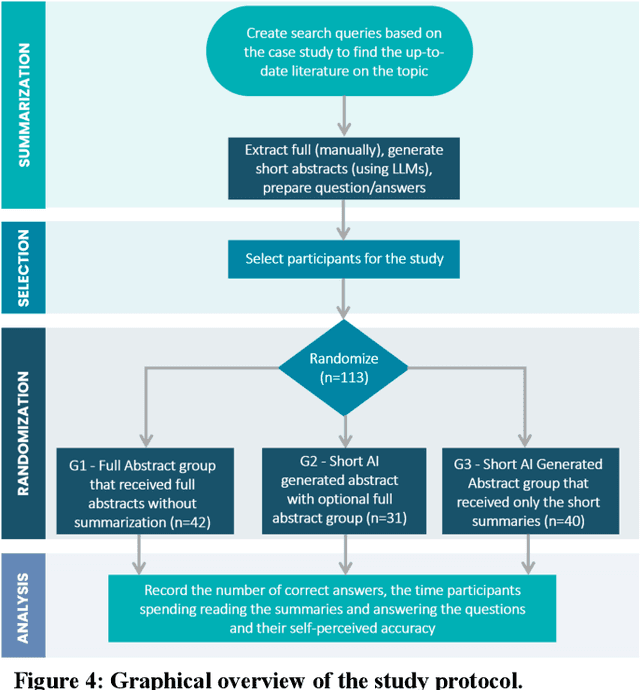
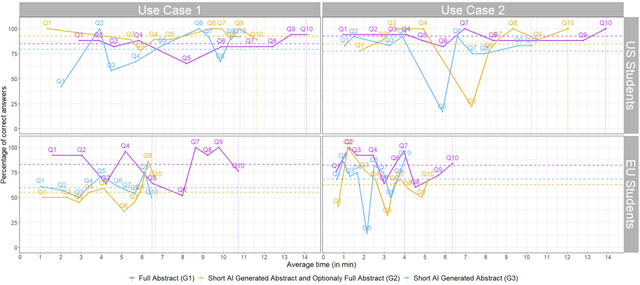
Abstract:Primary care professionals struggle to keep up to date with the latest scientific literature critical in guiding evidence-based practice related to their daily work. To help solve the above-mentioned problem, we employed generative artificial intelligence techniques based on large-scale language models to summarize abstracts of scientific papers. Our objective is to investigate the potential of generative artificial intelligence in diminishing the cognitive load experienced by practitioners, thus exploring its ability to alleviate mental effort and burden. The study participants were provided with two use cases related to preventive care and behavior change, simulating a search for new scientific literature. The study included 113 university students from Slovenia and the United States randomized into three distinct study groups. The first group was assigned to the full abstracts. The second group was assigned to the short abstracts generated by AI. The third group had the option to select a full abstract in addition to the AI-generated short summary. Each use case study included ten retrieved abstracts. Our research demonstrates that the use of generative AI for literature review is efficient and effective. The time needed to answer questions related to the content of abstracts was significantly lower in groups two and three compared to the first group using full abstracts. The results, however, also show significantly lower accuracy in extracted knowledge in cases where full abstract was not available. Such a disruptive technology could significantly reduce the time required for healthcare professionals to keep up with the most recent scientific literature; nevertheless, further developments are needed to help them comprehend the knowledge accurately.
 Add to Chrome
Add to Chrome Add to Firefox
Add to Firefox Add to Edge
Add to Edge